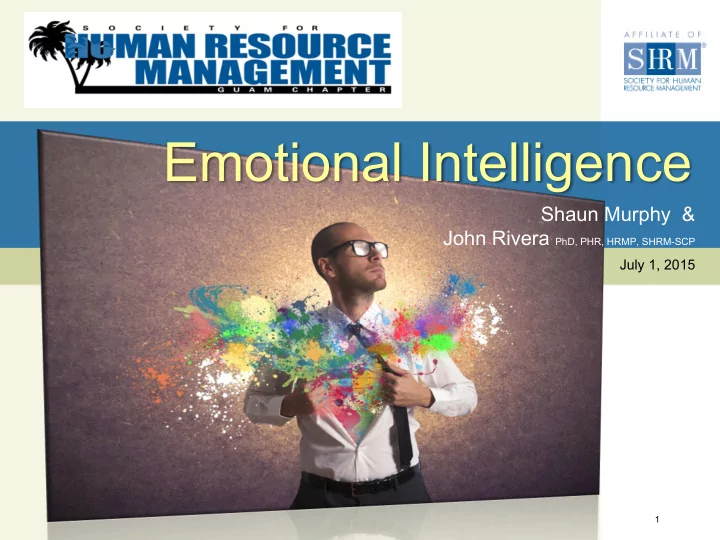

Emotional Intelligence Shaun Murphy & John Rivera PhD, PHR, HRMP, SHRM-SCP July 1, 2015 1
Employee Issues 2
Management Issues 3
Just an Issue … 4
Remember? • Someone who influenced you & your life. • What did that person do? 5
The Reign of IQ • Alfred Binet • WWI – Army Alpha and Beta tests • Ellis Island • IQ – cognitive capacity & function • One’s Ability to: q Learn q Recall q Apply q Think rationally q Reason q Problem solve 6
IQ • Predicts • Cognitive challenges related to jobs • Lower level job excellence (Technical Expertise) • Your IQ is fixed from birth • Don’t get smarter by learning new facts/ information • Intelligence-your ability to learn, same at 15 as at 50 • No Guarantee • High IQ à High Daily Functioning in Leaders 7
What’s Missing • Why do brilliant and well-educated people struggle? • Why do some individuals succeed in life? • Remember your HS Yearbook? – Who was going to succeed? – Did they? WHY? 8
The Whole Person • What makes us tick – our distinct qualities • Together they determine how we think and act. • Impossible to predict one based upon the other 9
EI or EQ • Harvard Business Review: – “a ground breaking, paradigm-shattering idea” – one of the most influential business ideas of the decade • Aristotle: ”Anyone can become angry- that is easy. But to be angry with the right person, to the right degree, at the right time, for the right purpose, and in the right way – that is not easy” • Flexible Skill – you can learn! 10
Surprise! At best IQ leaves 75% of job success unexplained, and at worst 96% . People with average IQs outperform those with highest IQs 70% of the time. 11
12
ROI • CCL– 8 EQ subscales could predict higher performance 80% of the time. • Study of Harvard Graduates (law, medicine, teaching & businesses): scores on entrance exam – had zero or negative correlation with eventual career success. • Telecom New Zealand: 48% of what differentiated high/low performance in senior leaders. • AMEX: 48% of performance variance between high and low performing sales reps. • USAF: Successful and Unsuccessful Recruiters / decrease retention • Pre-employment screening system • 92% increase in retention • $2.7 million in training cost savings in the first year alone • Congressional sub-committee report: recruiters 2x as productive as recruiters in other branches • USAF: Pararescue Jumper Trainees • In 2009 – approx. 82% failure rate for USAF PJ. • Those with high scores in 5 factors were 2-3x more likely to complete • Potential savings/cost avoidance - $19 million per yr. in training 13
Balance
Reality • 36% of people can accurately identified their emotions as they happen. • 2/3rds of us are typically controlled by our emotions and are not yet skilled at spotting them and using them to our benefit. • We are emotionally hijacked – when emotions control behavior and one reacts without thinking.
Emotions Prioritize Our Thinking 16
How We Are Wired Threat: Reward: Adrenalin Dopamine Cortisol Oxytocin Fight or Flight Serotonin
NeuroGenesis Developing EQ NeuroMythology NeuroPlasticity
the Plan Get Committed Get Practical Notice the Moment Persist
• Constructed with opinions from experienced practitioners and HR Professionals • “Combines holistic and eclectic assortment of existing observations, theories, methodological strategies, research findings, and a multifactorial comprehensive nature” • Supported by more than 17 years of research by Dr. Reuven Bar-On, Ph.D • Tested for Reliability, Internal Consistency, Test-retest reliability and dimensions of Validity • Premier measure of emotional intelligence • 1st empirically constructed test of emotional intelligence commercially available
• Unlike other trait-based instruments, EQ-i scores do NOT necessarily reflect skill or lack thereof • Degree to which each EQ element is active and or important in your life and some associated behaviors • Results of the EQ-i are an Impressionist painting in need of interpretation, not a photograph rendering a verdict • High Score vs. Low Score – More or less connection or attraction to the skill – May reflect behavioral development – Low scores may mean either a general discounting of the element in importance OR an extreme selectivity in the exercising of behavior or EQ element – High scores could also mean an overly developed, overdone or intense utilization of that EQ element
Recommend
More recommend